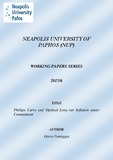Phillips Curve and Optimal Long-run Inflation under Commitment
| dc.contributor.author | Pontiggia, Dario | |
| dc.date.accessioned | 2016-01-21T11:42:59Z | |
| dc.date.available | 2016-01-21T11:42:59Z | |
| dc.date.issued | 2015-06 | |
| dc.identifier.uri | http://hdl.handle.net/11728/7099 | |
| dc.description.abstract | The Phillips curve represents the link between the business cycle and infation and constrains the actions of policymakers. In this paper, we study the optimal long-run rate of infation in the presence of a hybrid Phillips curve, which nests a purely backward-looking Phillips curve and the purely forward-looking New Keynesian Phillips curve as special limiting cases. The monetary authority possesses commitment and its objective function is derived as an approximation to the utility of the representative household. We show that the commitment solution for the monetary authority leads to steady-state outcomes in which infation is positive. Rising from zero under the purely forward-looking New Keynesian Phillips curve, the optimal long-run rate of infation reaches its maximum under the purely backward-looking Phillips curve. The consequences of positive steady-state infation di§er between the limiting case of a purely backward-looking Phillips curve and the case of a hybrid Phillips curve. | en_UK |
| dc.language.iso | en | en_UK |
| dc.rights.uri | http://creativecommons.org/licenses/by-nc-nd/4.0/ | en_UK |
| dc.subject | Optimal monetary policy | en_UK |
| dc.subject | Phillips curve | en_UK |
| dc.subject | inflation persistence | en_UK |
| dc.title | Phillips Curve and Optimal Long-run Inflation under Commitment | en_UK |
| dc.type | Working Paper | en_UK |
Files in this item
This item appears in the following Collection(s)
-
Conference papers99
Δημοσιεύσεις σε συνέδρια


